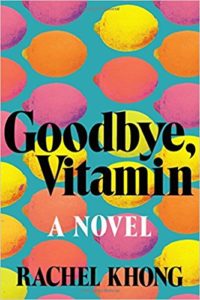Memories Fade, Memories Linger: a review of ‘Goodbye, Vitamin’ by Rachel Khong
By Alexis Shanley
Posted on

Absence populates Rachel Khong’s stellar debut novel, Goodbye, Vitamin. It’s a book about the absence of reliable memories, the absence of people you thought were permanent, and the absence of self-understanding. It’s about the memories that follow and haunt you, and the ones that only leave behind traces of themselves, their negative space haunting you all the same.
When we meet our narrator Ruth, she’s in her thirties and the life she envisioned for herself is in shambles. Her fiancé broke up with her on the day she thought they were moving in together. If that weren’t enough, she’s dispassionate about her job and her father, Howard, has Alzheimer’s disease, which is getting progressively worse. Everything she thought she could depend on has been upended.
Goodbye, Vitamin picks up the day after Christmas, when Ruth is home with her parents. Most of her past holidays were spent with her fiancé’s family, but she has nowhere else to go this Christmas, so she returns to where she grew up, a place that’s changed drastically from the last time she was there. During her visit, her mother asks her to consider leaving San Francisco and moving back in with the family for a year to help care for her ailing father. When Ruth makes the decision to do so, she confronts her own relationship to memory: memories from childhood, reminders of the things she’d forgotten, and coming to terms with the things she remembers but wishes she could forget.
The absence of her fiancé, Joel, falls into the latter category. Ruth is constantly reminded of Joel and the moments they shared. Her friends advise her to forget about him, which is something she resents. Her time with her father has made it clear that attempting to exert control over your memories is an intractable task. Howard forgets the status of her relationship with Joel and makes comments as if she’s still one half of a couple, making it impossible for Joel’s ghost not to hover over her.
Meanwhile, Howard’s life becomes defined by his disease, which is to say that it’s defined by absence. For instance, he loses his handle on social norms, such as when the police return him to the house disoriented and missing clothes. So much of his identity was entwined with his career as an academic, but he can no longer teach at the university due to his erratic behavior. Alzheimers itself is spoken of in terms of negative space. Ruth tells us:
There is, presently, no single test or scan the can diagnose dementia with complete accuracy. It’s only after the person is dead that you can cut his or her brain open and look for telltale plaques and tangles. For now, it’s a process of elimination. What we have are tests that rule out other possible causes of memory loss. In diagnosing Alzheimer’s, doctors can only rule everything out that it isn’t.
Interspersed throughout the novel are recollections Ruth’s father kept in a notebook detailing times they shared when she was a child. Ruth was too little to remember most of them; they would have been lost to time without the journal. These little notes—chronicling what she did each day—show the chasm between what once was and where she and her father are now. They take on even greater meaning towards the end of the novel, when the tables turn and Ruth’s narration begins addressing her father directly, describing what he’s done daily. His account was a collection of memories being made, whereas hers become an account of all that’s been lost.
Goodbye, Vitamin is the summer read I always hope for but could never find. Khong’s prose is unsentimental, which allows the novel’s emotional weight to build gradually and sneak up on you. On the surface, it seems like a sweet, funny read, despite the subject matter. Ruth is an engaging narrator, and it’s easy to let her voice distract you from the grim reality of her father’s disease. It isn’t until you’ve read the entirety of the book that you feel the bittersweet humanity of it. Weeks after reading Goodbye, Vitamin, I still catch myself marveling at how it sunk its teeth into my bones. It made me consider the ways in which the act of remembering is isolating in nature. You alone carry the memories that make up your life, and you alone are responsible for preserving that history of self.
Ultimately, the book examines what it all counts for if, in the end, our minds are so fragile, if everything we know is ephemeral. What does the time and energy we put into our lives matter if memories slip through our fingers like sand? How do we know that the people and things we invest in will be the ones that stick? At one point, Ruth surmises, “It doesn’t matter who remembers what, I guess, so long as somebody remembers something.” Maybe that’s the best answer we can hope for.